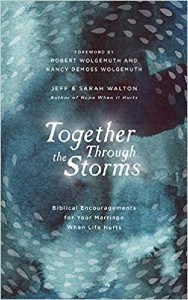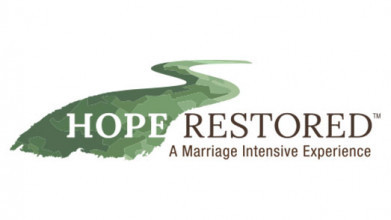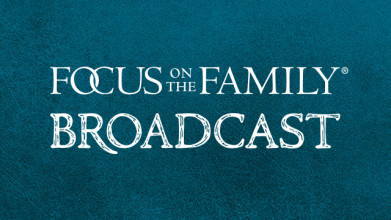[SFX of storm, failing engine of airplane]
Wife: Pull up honey! We’re going to crash!
Husband: Give me that radio! Mayday! Mayday! We’re caught in storm, losing altitude fast! Wife: It’s no use!
Husband: Come on, honey! You gotta help me here!
Wife: I just don’t know if this marriage is worth saving!
John Fuller: Well, sometimes the challenges that you and your spouse are facing seem impossible. And you might even wonder if it’s time to kinda bail on your marriage. Well, today on Focus on the Family, we’re gonna learn how hardships and suffering can actually strengthen your relationship and help you both grow closer to God in the process. Thanks for joining us today, your host is Focus president and author Jim Daly, and I’m John Fuller.
Jim Daly: John, when a man and woman are preparing for marriage, they tend to focus on the positives and how wonderful their lives are going to be, uh, looking toward the future. That’s a good thing, a natural thing.
John: Yeah.
Jim: We even say the vows for better, for worse, for richer, for poor, in sickness and in health. And I think when Jean and I, when we got married, we were thinking a lot more about the better the richer, the healthier part of that equation. We didn’t anticipate the bumps that naturally come with marriage, but the fact is every marriage will pass through some kind of storm, maybe multiple storms, uh, in law issues, financial conflict, uh, maybe the baggage you’re bringing in from your past or all of it who knows. Uh, you have to choose to navigate those difficulties and to, uh, really come up with a strategy to make sure that your marriage stays intact.
John: Yeah. And too many couples’ kind of crumble in those moments of difficulty. They don’t have a strong foundation to stand on. They can’t see a way to work together and they just kind of give up on the relationship.
Jim: Well, and I- I definitely agree with that. And that’s why we’ve invited our guest today, Jeff and Sarah Walton to join us. Uh, they have a remarkable story about heartbreaking troubles, uh, that have nearly overwhelmed their marriage and family. But through God’s grace and power, they’re still together learning to trust God, uh, each and every day, more and more, and that’s the key. You know, I think of John 10:10, I love that scripture. It was the first scripture that I actually memorized as a new believer at 15 years old, but it basically says the thief, Satan, comes to steal, kill and destroy. And I’m telling you folks when you’re, um, you know, in the marriage business, so to speak, uh, he comes after us with a vengeance and, you know, things divide us and things disrupt our marriages, et cetera, but that’s true of each and every believer. And, uh, if you are a believer in Christ, I know that you understand what I’m talking about, and we need to understand that, realize it, and combat that each and every day.
John: Mm-hmm. Yeah, and so Jeff, uh, currently works as a real estate broker. And, uh, prior to that was a trauma consultant, assisting doctors with implanting medical devices during surgery and Sarah is an author and speaker and blogger. And they, uh, have four kids. She stays at home with them and, uh, together they’ve got a book called Together Through the Storms: Biblical Encouragements for Your Marriage When Life Hurts and will encourage you to get a copy. Our number is 800-A-FAMILY or stop by focusonthefamily.com/broadcast.
Jim: Jeff and Sarah. Welcome to Focus on the Family.
Sarah Walton: Thank you so much. We’re so glad to be here.
Jeff Walton: Pleasure to be here.
Jim: Um, let’s get into it. Uh, when you first married, I think, like I said, Jean and I had those expectations of perfection, (laughs).
Sarah: Yes.
Jim: Everything was gonna be perfect.
John: Beautiful.
Jim: Beautiful.
Sarah: Yes, yep.
Jim: Uh, you know, I was the knight in shining armor, and she was my great, uh, damsel in distress that I saved somehow, some way. Uh, how did you envision it, uh, prior to you being married? What were you thinking?
Jeff: Yeah, I- I think I- I would relate exactly with what you’ve stated. So you walk into marriage, um, kind of have all planned out. I think I’m gonna have this type of career you wanna build and grow in your career. You wanna have a family and as you raise your kids, you think that they’re gonna follow suit, you know, and- and follow in line. And early in our marriage, we, uh, we faced kind of the complete opposite. We’re- we’re flipped upside down, but I think walking into that, it’s natural to think that you’re going to have better days than worse days. Um, but I guess as we look back on that, there’s so often that we, uh, I think as couples walk into marriage, not being fully prepared for the other side, for the w-
Jim: Mm-hmm.
Jeff: … for the worst, for the sickness. And so that’s something that I think has been on our heart and something that God has grown deeply in us, a- a passion for- for those couples and to prepare them for that.
Jim: Sarah, expectations. I think for women particularly-
Sarah: Mm-hmm.
Jim: … when you get married, there are certain expectations sometimes unspoken-
Sarah: Yes.
Jim: … which makes it really difficult for us guys, (laughs). ‘Cause we- we- we don’t know-
John: No clue.
Jim: … how do you want us to behave, we didn’t know that.
Sarah: Yes.
Jim: Um, did you have those expectations of what day by day it would look like week by week, year by year.
Sarah: Mm-hmm, yeah. Yeah, you know, I don’t, I think a lot of times we don’t really realize we have expectations. They kind of just naturally come and so it’s not until something opposite of that happens that you’re like, oh, whoa, that’s not at all what I expected. So I think like Jeff said, you go into marriage, and we were young. I was 20, he was 23. So I think we were a little bright eyed and not totally aware of what was to come. So I think all I really imagined was I was excited to start life with him. I was in love. I, um, I’d come off of a rough few years. So I think I kind of in that, back of my mind, I thought I’ve gone through my hard stuff. God has brought me through that. He’s grown me now is the time to really enjoy what God has for me. This is almost the redemption of what I just came through. Um, and you know, we had a short period of time where we really did enjoy just each other as a couple, but really not long after we got married, the tension of work and long hours and me being home and trying to navigate that. It didn’t take long for me to start wondering, okay, well, he’s gone a lot later at night than I anticipated. He’s gone really early in the morning, I’m on my own a lot. That’s not how I thought marriage was gonna be. I thought this was like a team type thing. Um, and so while we loved each other, it didn’t take long for those expectations to start kind of, um, crumbling a little bit.
Jim: Yeah.
Sarah: Um, yeah.
Jim: Let’s help the audience because you mentioned that physical impairment that you-
Sarah: Mm-hmm.
Jim: … had. What-
Sarah: Yeah.
Jim: … what took place and how did that, um, kind of become the first major obstacle for you?
Sarah: Yeah, well, I- I actually had dealt with a lot of health issues growing up. Um, but nobody could really figure out what was going on. It was really random things and so no one could connect the dots. So then we got married and it was, I think I was used to it. So it wasn’t really in the forefront. It was just kind of a nagging problem in my life. And then we got married not long after that. I started having increasing problems with stomach issues, kind of flu-like symptoms. And it kind of started to demand my attention a little bit more. It- it just couldn’t push it to the background. And so, especially with him having long hours, it just added a little bit of stress and that increased as children came, which is very common for health problems. Um, just the taxing, um, pregnancy and delivery and all of that started to increase those problems that had always been there. So they began to dominate life where I almost was not very functional. I was starting to be very fluish all the time, which if you know what feels like to have the flu, (laughs), you just don’t wanna do anything, you wanna lay in bed all day. So that started kind of come to the forefront in our relationship. And I started seeing doctors, but I still could not figure out what was going on with me. It- it took years until we started to figure that out. And in 2015 was when I was finally diagnosed with Lyme disease and the kids, other kids were starting to show different symptoms as well. And about a year later, they were diagnosed with the same thing that I had passed Lyme disease gestationally, which I did not know was possible.
Jim: Oh, wow.
Sarah: So that has manifested in all of them, which has created this to be a very difficult family journey.
Jim: Mm-hmm.
Sarah: ‘Cause it tends to not be covered by insurance. So, um-
Jeff: Yeah.
Sarah: … that continued and then I started to have several more ankle surgeries. So it kind of felt like getting blows from every angle.
Jim: Yeah.
Jeff: Yeah.
Sarah: Layer upon layer. And um, yeah. So the layers, like you said are really, I think what started to beat us down.
Jim: Jeff, in that regard, I mean, expectations, uh, you know, we’ve heard from Sarah, what that looked like, but for you, I mean, you’re working hard, you’ve got this demanding job, uh, Sarah’s alluded to that, the hours that it required of you. Most of us men say, okay, we’re providing, that’s our main thing. And you should be speaking to your spouse. You should be pleased that I’m able to put food on the table and take care of the mortgage. And this is the number one demand of me. Some people might feel that’s old fashioned, but there’s a lot of us in the Christian in community that operate that way because we believe a parent should be at home with young kids, particularly. So as that husband, that father, you probably thought, hey, I’m doing all I can do, but don’t let me put words in your mouth.
Jeff: No, that is, uh, from the standpoint of the job that I had. So I was a trauma consultant, um, as- as John had mentioned, orthopedic trauma. So on call 24/7, and it’s a very demanding job. Uh, I think the first half of that time, I was in that for about nine years. The first part of that was more tolerable. And then once we started having kids, uh, the increase and the demand of that just became more of a challenge. And then with our oldest son that we do have some extra challenges, uh, mental health and special needs with him, continued to evolve and create tension and stress. And so all during those times I was continuing to try and be faithful, hard worker, providing for our family, thought I was doing the noble thing of continuing to go and doctors would call and I w- I had to be there. And so this tension of- if I was not there, business would be lost. Loyalty was very on a, on a thin thread between doctors being quick to change over to another vendor.
Jim: Yeah. I’d say demanding doctors.
Jeff: Yeah.
Jim: That’s- that’s fair.
Jeff: Yeah.
Jim: I mean, they, they’ve got pressure too.
Sarah: Yeah, yeah.
Jeff: Sure.
Jim: But I mean, that’s the reality of that profession.
Sarah: Mm-hmm.
Jeff: That’s correct. And so I think from that standpoint, that is a, an area that we didn’t really communicate well. I think internalizing, I thought, okay, I am providing for my family, I’m continuing to- to work hard and I’m trying to do the noble thing. There were a lot of instances or a handful of instances, I would say because of our home life, the challenges with our oldest son, uh, things that became verbal and behavior and destructive kind of in our home put Sarah in a tough position. And so at the core of it, it was starting to wrestle with, I think, subtly the fear of man.
Sarah: Mm-hmm.
Jeff: And so do I, what would it take for me to- to say no to a doctor when Sarah was crying out? And that was something that I wrestled with often. Um, you know, I think it was easier, kind of a tug and pull on one end. I was able to get out of the house, catch my breath and try and transition compartmentalize and- and go do work. And then I come back and then it’s entering into chaos. And how do I enter back in, how do we get back on the same path. And in our scenario, and this is just in ou- that situation, uh, the extreme we faced, uh, Sarah was waving the white flag a couple times and I walked out on her.
John: Mm.
Jeff: And you know, it still just eats at me because I know that, uh, in hindsight I should’ve stayed, but it was the fear of man. It was the fear of what doctors would think. It was the f- fear of boy, I’m gonna lose a chunk of my income if he switches over to someone else and doesn’t use me. And so it’s, I think there’s probably, hopefully a lot of listeners that can relate just between the work balance and the family balance.
Jim: Yeah, it’s so true. And you know, again, this is why we’re doing this program. I’m so grateful that you’ve written the book. And I wanna mention this because, uh, your book Together Through the Storms, you have designed it to help couples prepare for and work through the inevitable problems that marriage will put in front of you, those difficulties. And you put point to the Old Testament, we all love to go to Job. Good old, I’m so glad God put Job in the Bible, right?
Sarah: Me too.
Jeff: Yes.
Jim: Uh, but Job has some great lessons for all of us when we’re suffering.
Sarah: Yep.
Jim: How did you pull the lessons from Job and apply ’em to your marriage? Sarah let’s start with you.
Sarah: Well, I mean, it’s- it’s kind of funny, I think when people hear that we wrote I a marriage book on Job-
Jim: (laughs) It’s- it’s not as great starting point.
Sarah: … very clear the look on their face is like I have no idea how that makes sense, but-
John: It’s so aspiring.
Sarah: Yeah, exactly.
Jeff: Most people wanna skip past the book-
Sarah: Yeah, (laughs).
Jeff: … after the first two chapters.
Sarah: I know.
Jeff: Let’s skip past it.
Sarah: Yeah. But I found, I think when we were going through and we had both been in Job a lot in that timeframe. And so I think we started to notice little things that actually jumped out to us that related how Job and his wife interacted, how we tend to respond differently to suffering, Job and his wife were in the same situation. They both lost all that they lost, but it shows how differently we can respond to that suffering. Um, I think it shows how much the enemy is at work to really tear us apart and how much he uses that and sees that as a way that he can gain ground in your marriage is by just simply turning you against each other. And what’s the best way to do that is to throw arrows at you that are going to send you maybe reeling into different types of directions, grieving differently, struggling, not communicating all those things naturally come up. And so if you’re not grounded in the word and you have not been prepared for that, it tends to kind of flip us on our heads.
Jim: Well, and for those listening and viewing that, you know, may not be as familiar with the story. This is where Job’s wife says in his despair, “Why don’t you just curse God and die?”
Sarah: Yep.
Jim: I mean, you don’t wanna hear that from your wife.
Sarah: No-
Jeff: No, thank you.
Sarah: … no, what I would say-
Jim: (laughs) It’s like what?
Sarah: … I really love it- it, something stuck out to me when we were going through that, of how Job responded to her and he said, “You are speaking like one of the foolish women.” He wasn’t saying you are a foolish woman, Job’s wife, you are speaking like one of them, this is not who I know you to be.
Jim: Mm.
Sarah: And so even in him calling her out on what he knew was not correct, he did it with graciousness and he was not tearing down her character, he was saying, no, that’s not what you believe. I don’t believe that’s what you are believing, but that’s what these other women would say, who do not follow the Lord. So I appreciated that because I think that can be a very, very small difference in the way that we-
Jim: Yeah.
Sarah: … approach each other.
John: We’re talking today on Focus on the Family with Jeff and Sarah Walton. And, uh, they’ve written a book, Together Through the Storms. This is applicable to all of us who are married, pretty much anybody that walks in life, whether you’re single or married, you’re gonna find some storms. You’ll find some great encouragement in this book. And you can call us to get your copy. Uh, our number is 800-A-FAMILY, or stop by focusonthefamily.com/broadcast.
Jim: Let’s get to that breaking point in your marriage that you highlight in your book. What was that moment and how did you both feel emotionally and spiritually at that time?
Sarah: Yeah. Well, I will say, I and this is actually one of my favorite chapters in the book is titled, You Can’t Change Your Spouse’s Heart. And-
Jim: Hold it, say that again.
Sarah: (laughs) I know we all need to be reminded of that a lot. Um-
Jim: It’s like what we all try to do first thing, I know, let me try to change you.
Sarah: That’s definitely the natural response is we kind of think the other person is the problem in this situation. Only thing I’m always right about is that I always think I’m right. I mean-
Jim: (laughs).
Sarah: … that is just the natural instinct of man. But I remember sitting in the couch one day and we had, part of our stories Jeff had walked away from that job, which was an incredibly difficult situation. It was to the point where our family was in crisis. Um, our marriage was literally falling apart. We were barely communicating without crying together, like either anger or tears. And I remember sitting on the couch one day, we had just moved, left our home that we had sold, had downsized. We were in the smaller rental home. And there had been so many instances where I had felt so hurt when I was in literal crisis in, at our home and he would have to walk out. And I knew what I’d signed up for. It had been many, many years, I was really okay with it. I always told myself he’d be here if he could, but I know that he can’t, but there were a handful of times where it was serious stuff that I felt really terrified that he’d be leaving. And so when he would leave and he would not be present with me to see what went down in the house and to see the hurt that I experienced, he would come home and I could try to explain it, but he had never been there in that really, really hard place. And so that started to kind of buildup in me. I started to build little bits of resentment of like, he can’t even experience what I’ve walked through. It’s not fair that I’m the one bearing this burden. And so we were trying to work through it, and I kept trying to explain to him, Jeff, this is how much I felt hurt. This is how much it hurt when you walked out in that one instance. And every time we had a conversation, it was worse, (laughs). It was like, I kept trying to rephrase it. You know, how we women like to do. Um, and every conversation left, I think just with more frustration, he was not understanding what I was trying to get him to grasp. I was just, I was angry. I was hurting and I wanted him to be able to enter into my pain. And finally, one day after many, many of these conversations, I felt the Lord just pressed on me, “Sarah, stop looking to Jeff for your comfort and for your satisfaction and start turning to me.” And I, it was a sacrifice. I really wanted him. I felt like, “But Lord don’t, to have a good marriage, don’t we have to be on the same page. Doesn’t he have to somewhat understand. And it was like, he said, “That is my job is to work on Jeff’s heart. I want you to come to me first.” And so I started praying, I started bringing the hurt that I felt to the Lord. I started to realize how much Christ was the only one that was in that room with me during those really scary times. Even if Jeff had been there only Christ knew what it felt like to be in me, to be-
Jim: Yeah.
Sarah: … a woman to be dealing with what I was dealing with. And he’s ultimately the only one that can truly comfort me.
Jim: Well, in many ways, we’re- we’re at a point where we started, which is that idea of expectations again.
Sarah: Yeah, yeah.
Jim: You know, the expectation that Jeff could meet that need and he was incapable. A good concept that you bring up in the book that I totally agree with is this idea of building bridges instead of walls.
Sarah: Mm-hmm.
Jim: It’s such an obvious illustration but describe it.
Jeff: Yeah. I think from a standpoint of, it’s very easy to build walls within the marriage and often those are subtle and before we know it, they’re popping up left and right,
Jim: To me, it divides between emotion and- and spirit. Building a wall is emotional response.
Sarah: Yeah.
Jim: Building bridges is a spiritual response.
Sarah: Yeah.
Jeff: Yeah, that’s- that’s uh, helpful. And so I think when we look at building bridges, uh, we have to continue to rely on the spirit. I think we have to come and be able to recognize that we can’t do this apart from him. And so it’s that humility that is that struggle, that all of us have within our flesh. We want to take control. We want to have our lives look a specific way, but when we are up against the wall and we face suffering and we see that with Job finally at the end, where he comes from the turning point of- of hearing to seeing then the- the beautiful part of that is the bridge has been built when we continue to not look just at our circumstances and what’s across the table with our spouse, but then we’re able to have that open communication, that bridge, that first needs to start with the Lord and not putting up a wall between, uh, myself and him.
Jim: Yeah.
Jeff: So that bridge, once that is built, then we can have the bridge that’s better with our- our spouse and continue to talk to them and work through these because it’s gonna be inevitable that we’ll continue to go through cycles.
Sarah: I’d also say, I think one thing that helps build that bridge is to stop seeing our differences as a negative thing. There’s so much that I have grown because Jeff is different than me and vice versa.
Jim: (laughs) I’m laughing just because it’s so true.
Sarah: It is. I mean, you- you naturally, at the beginning, like you were saying expectations, you think your way is right. You think your perspective is right. But Jeff and I are very different people. We have a lot of things we enjoy together, but we are very different in many ways at the same time. And so those things that used to be major contrasting things as we’ve gone through these difficulties, and we have gradually built those bridges and seen, oh, Jeff, it’s kind of good that he can hold himself together at times emotionally when I’m falling apart, because he kind of helps keep us both afloat during that season where my emotion and helping him express that has been a beneficial thing for us to be able to communicate that together. So there are so many different parts about us that we have to remember that we’re teammates, we are enemies in this. We are on the same page. And really, if you think about it, you and your spouse are the only ones that can understand just how much you are walking through. It’s a gift that you have each other, you’re not gonna respond to it the same. And that’s where we have to realize that’s not always a negative thing. We can help gradually come together closer as we understand how we both process those things, differently and can actually strengthen both of us.
Jim: I wanna make sure we give, you know, handles to people that are saying, oh my goodness, this is where my marriage is at. This is what we’re experiencing to some degree.
Sarah: Yeah.
Jim: One of the takeaways that you have in the book is grieving with hope.
Sarah: Yeah.
Jim: Describe that.
Jeff: Yeah. I think understanding, again, it’s the expectations that there are going to be different cycles of that within the marriage, Sarah grieves differently than I do. Uh, we process things differently and that’s part of, again, working through that, it’s not all pretty, and it’s something that by God’s grace we’ve grown in. And so when we can grieve our losses and give each other space, I think as we look at the story of Job, we see beautifully Job walk through that process of bringing his pain, his confusion, all of his questions to God. And he even says that, you know, that’s kind of the complaining aspect of it in a healthy, biblical way. It doesn’t stop there though, because that’s what the world does. Worldly lament stops there.
Jim: Yeah.
Jeff: Why the anger, taking it on God, blaming God. But when we can move past that and bring our pain and our hope, and remember back to who God is, that’s the beauty of-
Jim: Mm-hmm.
Jeff: … Job is-
Sarah: Mm-hmm.
Jeff: … we don’t get a answer to his question of why, but yet what we come away with is a better understanding of who God is. We see God in chapter like 38 to 40 come to mind of saying, where were you when I created? And then there’s a long list of all those things.
Jim: (laughs) Those are big questions, right?
Sarah: Yes, they are. They’re laying the foundation of the world.
Jim: When you, when you mention the why, I do wanna wrap up in that area, because I think most people relate to the why question, God, why have you allowed this to happen? And you mentioned in the book, uh, a better phrase is to say, what we know is better than what we don’t know, explain that.
John: Mm.
Sarah: Yeah. This is where it’s so important, um, to have, to be planted we’re in the streams of water. In talking about how, if we, our roots are not growing deep, we’re just constantly be fed, being fed by God’s word, being fed, um, by being with the body of believers, having that foundation, then we’re easily gonna be swayed. And so when suffering comes, it immediately shakes our foundation of who we think God is. We all come with these preconceived notions of what does it mean that God’s good? What does it mean that he’s faithful? Well, I might think God’s goodness means he gives me something I think I really need. So when that thing doesn’t come, that belief is shaken to say, okay, well, if that’s not true, then what does it really mean that God is good. And that’s what we see through the entire, um, book of Job. When Job goes from hearing of who God is to now seeing, it really everything that he believed about God was put to the test. So, whereas the beginning, he was faithful, and he believed that God was good, but it wasn’t until the end of Job when he’d walked through losing everything till, he knew and had seen God’s goodness, in a way he couldn’t have understood at the beginning. And the only reason he was able to do that is by holding onto the promises of what God has said is true. He could not fix his hope on the fact that God would restore, which he graciously did, but he still did not restore his 10 children he lost, he was still gonna grieve those. They were not gonna be returned even though he had more children. So I think it’s just helpful to see that, um, how we can end up knowing and keeping our foundation and keeping our footing by looking to what can I fully grasp onto is true. Only the promises of God can I fully grasp onto, I cannot guarantee that I will have this thing I desire. I cannot guarantee I will be better and healed. I don’t have that promise. I will eternally, but I don’t have that promise in this life. So if I fix my hope on me getting better physically, or my son being healed mentally, and if that’s where my hope is, I’m gonna constantly being swayed by the winds that are coming.
Jim: Yeah. And what a great place to end. Uh, Jeff and Sarah, this has been so good.
Sarah: Oh, thank you so much.
Jim: And I hope, I hope people that are in difficulty really do get a copy of your book and, uh, we’ll make it available to you. Um, we realize that you may not even be able to afford that. Just, uh, get in touch with us. We believe in the content. We believe it will help you and we’ll trust others will cover the cost of that, if you can make a gift of any amount, uh, perhaps even join us as a monthly, um, sustainer, we would appreciate that. That really helps us continue to minister together to those marriages that are truly hurting. And I wanna mention too, Hope Restored.
John: Mm-hmm.
Jim: That’ one of our wonderful intensive, um, marriage programs where, uh, y- y- usually is a four-day process where people who have signed divorce papers, uh, for the most part, really, uh, stuck in their marriage come and we have thankfully a post two-year 80% success rate-
Sarah: Mm, wow.
Jim: … where those marriages are thriving and doing better. So if you’re in that spot, call us, uh, to ask about hope restored.
John: You can learn more about Jeff and Sarah’s book, Together Through the Storms, and you can also find out details about Hope Restored our marriage intensives, when you give us a call. Our number is 800, the letter A, and the word FAMILY, 800-232-6459, or stop by focusonthefamily.com/broadcast. Next time you’ll hear a great presentation from Dr. Bill Lile, uh, a medical argument for the sanctity of life in the womb.
Preview:
Dr. Bill Lile: The only biologic sense is that we’re created in the image of God at that moment of conception. When oneself from the mom and oneself from the dad got together, that’s when we were created in the image of God.
End of Preview





















